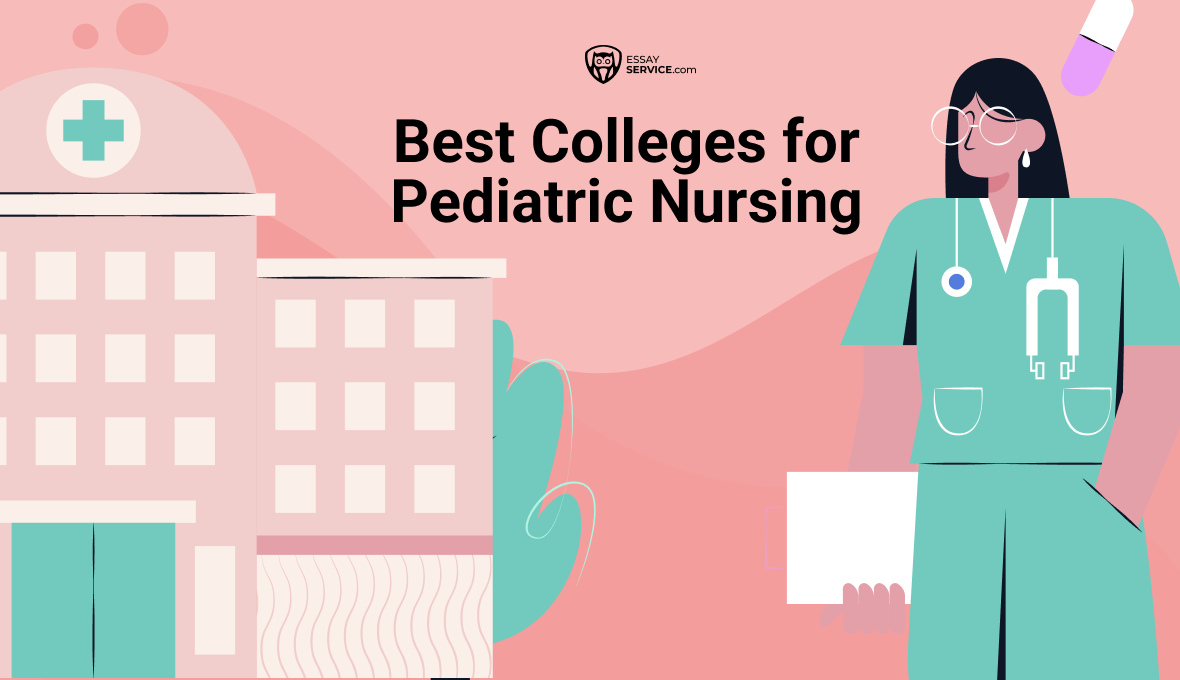Pediatric nursing, a heartwarming yet challenging profession, demands a unique set of skills to care for our youngest community members. Aspiring pediatric nurses face the crucial decision of selecting the right college to launch their careers. Their responsibilities span from administering vaccinations to collaborating with families and other healthcare professionals. The impact of pediatric nurses is profound, making the choice of the right educational institution paramount for aspiring professionals.
Since choosing the ideal college involves more than just program reputation, prospective students often weigh financial aid options, net price, admission requirements, and the overall learning environment. In this article, experts at our nursing essay writing service will explore the best colleges for pediatric nursing, considering not just academic excellence but also financial aid, net price, SAT range, acceptance rate, and the caliber of professors at each university.

Duke University

Duke University's pediatric nursing program empowers students with skills for comprehensive primary health care across diverse age groups. The curriculum integrates one-on-one clinical practice in various settings, including clinics, community practices, school-based health clinics, and hospitals.
Duke University stands out for offering specialty certificates to Master of Science in Nursing and Doctor of Nursing Practice students, along with practicing pediatric nurse practitioners. These certificates, distinct from continuing education, provide specialized, graduate-level courses within specific APRN majors.
The Certificate in Nursing Education, open to registered nurses with various qualifications, enhances educational expertise for those aspiring to teach in pediatric nursing schools and healthcare settings.
The Post-DNP Executive Leadership Specialty (ELS) certificate, part of the Doctor of Nursing Practice Program, equips seasoned pediatric nurse leaders with advanced skills for navigating complex healthcare organizations. A one-year, part-time, distance-based program, it focuses on organizational leadership, trend analysis, population care design, and crisis management. Duke University ensures flexibility to accommodate professional schedules, making this an ideal choice for those aiming to lead in pediatric healthcare.
Benjamin Smallheer
Ph.D.
Associate Clinical Professor in the School of Nursing.
Mary Louise Affronti
M.S.N.
Clinical Professor in the School of Nursing.
Margaret Therese Bowers
D.N.P.
Clinical Professor and Director of the Cardiovascular Specialty.
Margaret Bush
Ph.D.
Clinical Professor/Licensed pharmacist with board certification in oncology pharmacy.
University of Pennsylvania

The University of Pennsylvania's MSN program is committed to cultivating graduates who creatively apply knowledge and skills, emphasizing clinical decision-making and effective management. Aligned with the AACN Essentials, Penn Nursing MSN graduates possess a unique skill set, demonstrating proficiency in scientific inquiry, advanced pediatric nursing skills, leadership, and network utilization.
Graduate pediatric nurses at this university showcase the ability to translate evidence into practice, perform advanced pediatric nursing skills for specialty practice, lead quality improvement initiatives, and leverage networks for professional advancement. The program emphasizes specific learning outcomes for MSN APRNs, including care planning for population-specific diagnoses and delivering educational interventions using advanced health assessment and other disciplines.
While preparing students for national certification, APRN program graduates may need to fulfill additional state-specific requirements. The University of Pennsylvania stands as a leader in shaping visionary MSN graduates poised to make impactful contributions to pediatric nursing.
Dolores Albarracín
Ph.D.
Renowned scholar in the fields of attitudes, communication, and behavior.
Carmen Alvarez
Ph.D.
Associate Professor of Nursing/Researcher and family nurse practitioner.
Shoshana V. Aronowitz
Ph.D.
Assistant Professor, Department of Family and Community Health.
José A. Bauermeister
Ph.D.
Chair of the Department of Family and Community Health.
Thomas Jefferson University

Thomas Jefferson University's Pediatric Primary Care Nurse Practitioner (NP) specialty is tailored to equip graduates with advanced skills in caring for children and their families. Pediatric advanced practice nurses trained in this program are versatile, providing expertise in clinical practice, school-based health, home health, public health, and acute and long-term care settings.
Graduates at this university meet the academic requirements to sit for the Certified Pediatric Nurse Practitioner - Primary Care (CPNP-PC) Examination administered by the PNCB. Successfully passing this examination earns program graduates the esteemed credential of CPNP-PC. The university stands as a hub for nurturing professionals ready to excel in the direct care of infants and children across diverse healthcare settings.
Diane Abatemarco
Ph.D.
Professor/Director, Maternal Addiction Treatment, Education & Research.
Sarah Ackerman
Ph.D.
Assistant Professor.
Stephen DiDonato
Ph.D.
Research on the Impact of trauma on clients'/patient coping mechanisms.
Angela Marie Gerolamo
Ph.D.
Psychiatric mental health nurse practitioner.
Saint Louis University

Saint Louis University's Trudy Busch Valentine School of Nursing prepares students for professional pediatric nursing practice at the baccalaureate, master's, post-master's, and doctoral levels. Students will also learn methods of interprofessional collaboration that are critical for caring for the whole person, the "cura personalis."
SLU’s direct-entry program is for students beginning college immediately after high school or students who will transfer from another university or community college. The program allows for study abroad, offers clinical experience in numerous St. Louis area hospitals and provides access to their advanced simulation labs.
This direct entry 21-month program at this university is designed for those who are not registered pediatric nurses but have already earned a bachelor's degree in another field. Students will earn a Master of Science in Nursing (M.S.N.) and be prepared to sit for both the nursing licensure exam to become a registered nurse and certification as a clinical nurse leader (C.N.L.).
Kathleen Armstrong
Ph.D.
Assistant Professor/Member of Oncology Nursing Society.
Deborah Horton
M.S.N.
Instructor of ABSN Program - Health Promotion; Public Health Nursing (theory and clinical).
Margaret R. Benz
M.S.N.(R)
Instructor of undergraduate traditional option adult medical surgical content, clinically supervised students in critical care units, master's nurse practitioner program.
Amy S. Berkley
Ph.D.
Instructor of undergraduate traditional option and accelerated programs.
Simmons University

Simmons University boasts one of the country's inaugural university-based pediatric nursing programs, maintaining a proud legacy as one of the field's premier institutions. Acknowledged for clinical excellence, the school is committed to shaping future healthcare leaders through comprehensive undergraduate and graduate pediatric nursing degree programs.
Simmons University educates pediatric nurses to deliver compassionate, evidence-based care, champion patient and community advocacy, lead interprofessional teams, and contribute to cutting-edge research. Whether in the traditional four-year BSN or accelerated second-degree programs, undergraduate students receive exceptional education.
The university's partnerships with renowned institutions like Brigham and Women's Hospital, Beth Israel Deaconess Medical Center, Boston Children's Hospital, and Massachusetts General Hospital enrich the education of BSN Nursing students. Clinical rotations, talks, research, and employment opportunities with industry experts contribute to a well-rounded learning experience.
At the heart of healthcare at this university, the students are recognized as the best and brightest in their field. Whether pursuing graduate school or entering entry-level positions in acute inpatient units, community health centers, offices, homes, hospitals, or schools, BSN holders from Simmons are poised for impactful careers in the pediatric nursing profession.
Kimberly Boothby-Downing
M.S.N.
Adult Nurse Practitioner.
Tanya Cohn
Ph.D.
Her teaching focuses on research across the lifespan and scholarly activities for developing the best evidence.
Tina Delouchry
D.N.P.
Primary Care/College Health/Travel Medicine
Carmen V. Harrison
Ph.D.
Course Coordinator for the Foundations Curriculum/Teaches in the DNP program and Health Professions Education program.
University of Nevada

The Master of Science in Nursing (MSN) program at the University of Nevada, Reno, is tailored for registered nurses aspiring to excel in advanced practice, education, and leadership within the healthcare sector.
This pediatric nursing program propels students to elevate their clinical competence and refine their application of theoretical frameworks for pediatric nursing practice. Beyond skill enhancement, MSN education at the University of Nevada, Reno, serves as a gateway to scholarly activities, laying the foundation for those considering pursuing a doctoral degree in nursing.
Participating in the MSN program not only nurtures increased clinical sophistication but also provides a platform for students to explore their creative potential and engage in collaborative endeavors with fellow healthcare professionals. The University of Nevada, Reno, stands as a cornerstone for those seeking to advance their pediatric nursing careers and contribute to the ongoing evolution of healthcare.
Stephanie DeBoor
Ph.D.
Professor & Associate Dean of Graduate Programs.
Kim Baxter
D.N.P.
Associate Professor.
Jasen R. Brooks
M.S.N.
Certified Pharmacy Technician.
Shannon Burleson
Ph.D.
Research in nursing student burnout.
Emory University

Emory University's Pediatric Nurse Practitioner-Primary Care program focuses on equipping graduates with specialized skills in primary care for children. The program ensures comprehensive preparation to meet the healthcare needs of infants, children, adolescents, and families across diverse primary care settings.
A notable feature is the requirement for graduates to complete 500 hours of supervised clinical practice in pediatric nurse practitioner roles. Clinical sites, including prestigious institutions like Children’s Healthcare of Atlanta and other pediatric clinics, provide diverse experiences.
Emory University's degree in nursing is tailored to individual student needs, offering personalized clinical placements and preceptors. Graduates are well-prepared for the pediatric nurse practitioner certification exam, leading to roles where they provide holistic, family-centered care in various healthcare settings, including ambulatory primary health care centers. Former students secure positions as coordinators in pediatric care units and NICUs, reflecting the program's success in producing skilled pediatric nurse practitioners.
Autherine Abiri
D.N.P.
Certified family & emergency nurse practitioner.
Corrine Ann Abraham
D.N.P.
Expertise in Acute And Chronic Care
Amy M. Becklenberg
D.N.P.
Child And Adolescent Health.
Ann-Marie Brown
Ph.D.
cute Care Pediatric NP Specialty Director.
University of Rochester

The University of Rochester School of Nursing stands as a premier institution shaping nurse practitioners, particularly those focused on pediatric care. This specialized program equips practitioners to deliver healthcare across diverse settings, including primary care offices, school-based health centers, specialty practices, and pediatric emergency departments. The curriculum is designed to address prevalent behavioral health issues encountered in pediatric primary care, such as ADHD, bullying, and risk-taking behaviors.
The programs prioritize the development of healthcare providers grounded in scientific evidence, capable of analyzing unique needs, engaging in scholarly activities, and ensuring ongoing competence through continuous education. Graduate pediatric nurses at this university are not only equipped to create comprehensive, patient-centered plans of care but also to implement quality and patient safety principles for continuous improvement.
Upon completion of the program at The University of Rochester, students emerge with the ability to synthesize scientific knowledge, design care plans that promote health equity, collaborate effectively with interprofessional teams, and demonstrate a commitment to ethical principles.
Marina Aleksandrowicz
M.S.
Instructor of Clinical Nursing.
Ty G. Andrews
M.S.
Data Director, UR Nursing Assessment.
Gamji Rabiu Abu-Ba'are
Ph.D.
Assistant Professor of Nursing & Public Health.
Danielle C. Alcena-Stiner
Ph.D.
Assistant Professor/Asst. Director, Life Sciences Learning Center, URMC
University of Virginia

At the University of Virginia's School of Nursing, students are prepared to become nurse practitioners and advanced practice nurses, delivering exceptional frontline care to children as clinicians, educators, and researchers. Boasting the #7 public MSN program and holding the title of Virginia's #1 nursing school, UVA offers full- and part-time options, guaranteeing admission for School of Nursing alumni.
The university's degree in pediatric nursing spans two years for full-time students or three years for part-time students, with graduates eligible for the primary care PNP certification exam administered by ANCC or PNCB.
The PNP-PC track builds on the theoretical knowledge and clinical experience of BSN-prepared nurses, emphasizing community-based primary health care for pediatric patients. The curriculum covers acute illness identification, pediatric nursing and medical management of acute and chronic conditions, and the development of a knowledge base for community health promotion.
Ryne M Ackard
M.S.
Director of UVA Nursing's Mary Morton Parsons Clinical Simulation Learning Center.
Kimberly Deanne Acquaviva
Ph.D.
Innovator and authority on LGBTQ aging and end-of-life issues.
Jeanne L. Alhusen
Ph.D.
Associate dean for research, professor of nursing, and an award-winning scholar and mentor
Joel R. Anderson
Ph.D.
Clinical Instructor of Nursing.
Bowie State University

For nearly three decades, Bowie State University has been transforming compassionate individuals into dynamic nursing professionals. Their pediatric nursing program, renowned in the region, boasts a cutting-edge simulation laboratory and community-based clinical placements, ensuring students are well-prepared to deliver optimal client care. Graduates emerge equipped with critical thinking abilities, technological mastery, leadership skills, and a collaborative approach to address healthcare needs globally.
As a nursing major at this university, students focus on end-of-program student learning outcomes (EPSLOs), emphasizing the ability to implement the pediatric nursing process, utilize critical thinking for optimal wellness promotion, engage in effective communication and inter-professional collaboration, integrate culturally congruent care concepts, apply evidence-based findings for clinical decision-making, adhere to legal and ethical principles, and address the evolving healthcare needs of diverse populations globally.
Bowie State University's nursing program prepares students to practice within the ethical and legal framework of professional pediatric nursing, emphasizing adaptability to changing healthcare needs and fostering leadership skills. The university provides pediatric nursing students with state-of-the-art technology and virtual simulation, enhancing learning through simulation activities, resource centers, and hands-on experiences with SimMan, SimBaby, and Noel—a pregnant female mannequin demonstrating the full life cycle of gestation and childbirth. With one-on-one support from qualified nursing faculty, students gain confidence in client care in a simulated, non-threatening setting.
Juliana Agubokwu
Ph.D.
Nurse Educator, Consultant, Wellness Expert and Public Speaker
Darrick Cochran
M.S.N
Nurse Manager of the Fort Meade Clinic at the Baltimore VA Medical Center.
Marianne F. Moore
Ph.D.
Associate Professor.
Javonna O'Brien
D.N.P.
Board-Certified Family Nurse Practitioner specializing in chronic pain and addiction medicine.

.png)

.webp)
